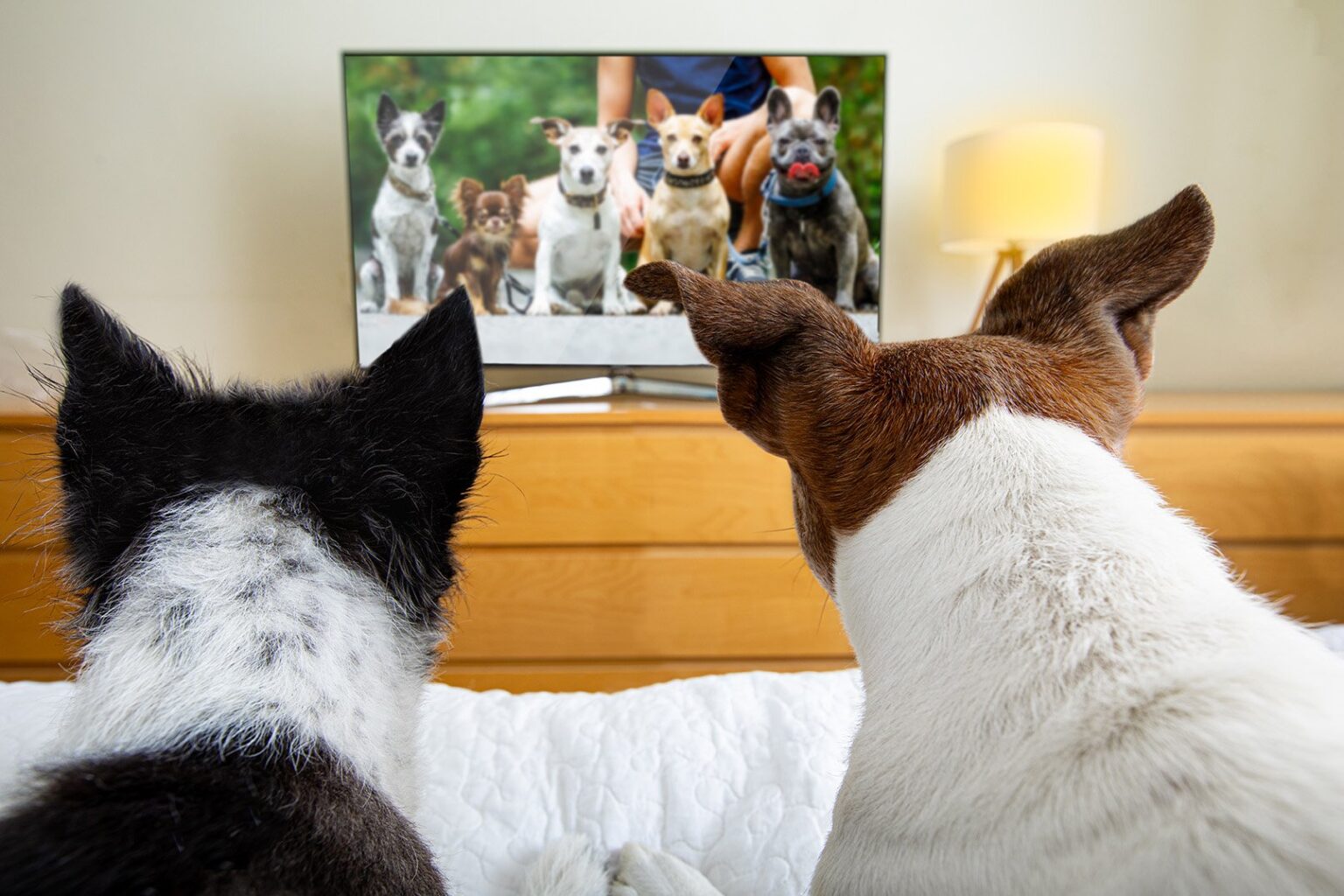
Why Do Dogs Watch TV
It’s Saturday night, and you’re snuggled up on your sofa for the evening, watching your favorite TV show or movie. Suddenly, your dog sits up, cocks his head, and stares intently at the screen.
So, what’s happening?
In this fascinating article, we look at the veterinary science behind your dog’s vision and answer the question, “Do dogs really watch TV?”
What Does Your Dog See?
We know that dogs often react to images and the sounds of animals on the TV screen pretty much as they would in reality. That makes sense when you consider that a recent study showed that dogs could pick out pictures of canines in a mix of images showing people and other animals.
That said, there are a few notable differences between you and your furry friend’s vision. First, your dog’s eyes are much quicker at registering images than yours. So, an old-style TV that presents a picture made up of fewer frames per second than a state-of-the-art set would flicker like crazy to your dog.
A dog’s vision is “dichromatic.” That means dogs see in two main colors, blue and yellow. Your vision is “trichromatic,” which means you can see the full array of colors.
Dog TV … Seriously?
With that in mind, there’s an HDTV cable channel specially designed for dogs.
DogTV presents different canine interest films that are shown at a higher rate of frames per second and in dichromatic color, perfect for canine viewing.
And all dog’s tastes are catered for on this hugely popular channel.
For example, an excitable pup can chill out by watching images of other dogs relaxing in a grassy meadow, or a more laid-back type might enjoy some all-action footage of surfer dog dudes riding the waves down in Southern California. There’s even some educational stuff, too, such as dogs obeying commands or demonstrations of how a dog should react when someone calls at your home.
Keeping It Real
Although you might see your dog taking an interest in nature programs that feature wildlife moving about on the screen, your furry friend won’t be interested in cartoon critters.
So, there’s your proof that dogs really can see what’s presented to them on the screen in much the same way as you do.
Or can they?
Actually, a dog with good vision typically sees at 20/60, whereas you see at 20/20. That means that you can comfortably watch your TV from six feet away on your sofa but your dog needs to be much closer to the set, usually around two feet from the screen, to see what you see.
If the dog is too far from the screen, the picture will appear fuzzy and unclear, so the dog will quickly lose interest. That’s why your pooch likes to lie right in front of the TV set, so he doesn’t miss out on any of the action.
What About Visually Challenged Dogs?
A dog’s ability to enjoy a night’s TV viewing depends on his age and general eye health.
For example, a senior dog with cataracts won’t be able to see very clearly. In severe cases, the dog might only be able to view light and dark, not colors.
However, you’ll still notice your partially sighted pup reacting to the TV on movie night, but that’s because his sense of hearing has taken over from his vision. So, even though your senior dog can’t see Lassie in action, he can still enjoy the barking and might even join in if he’s so inclined.
Is Watching TV Good For Your Dog?
So, dogs can see certain colors, detect movement, and react to sounds from the TV. But is watching TV good for your dog?
Well, according to a New York Times article, a psychology professor and a veterinarian, amongst others, conclude that watching a little TV can be beneficial for your dog, especially if he’s left home alone sometimes. Leaving the TV on for your pet can help to prevent boredom and provide some entertainment for your dog.
That said, just as for people, too much TV and not enough exercise is not a good thing for your dog’s physical and mental health. Dogs are hard-wired to enjoy outdoor fun and exercise, so you can’t sit Fido in front of the goggle box for an hour instead of taking him to the dog park or heading to the trails for a long walk.
Canine Personality And Breed Vs. TV Viewing
Your dog’s personality and breed have a big influence on whether your canine companion enjoys watching TV or not.
Just like people, some dogs love to sit in front of the TV every evening, whereas others would much prefer to play with their toys or romp outside in the yard.
And different dogs react differently to TV. Some curious pups might tilt their head when a certain sound comes from the TV, such as a cat meowing or a wolf howling, whereas other dogs will leap at the screen and bark like crazy.
However, in homes where the TV is on most of the time, the dog might become totally desensitized to the background noise and show no interest whatsoever.
Breeds
Your dog’s breed can also heavily influence how much interest your pet has in the TV.
For example, if your dog is a herding breed, such as Border collie, his attention is likely to be caught by people, animals, or objects moving around on the screen. That’s because those breeds are genetically hard-wired to watch for movement.
Final Thoughts
Why do dogs watch TV? Most likely, the answer to that question is just simply because they can, and they enjoy being entertained, especially by other dogs and animals on-screen.
Although your dog’s vision works differently from yours, your pet can still enjoy the entertainment that moving images and sounds provide. Just make sure that you keep your TV set tuned to DogTV or one of the nature channels when Fido’s watching!







